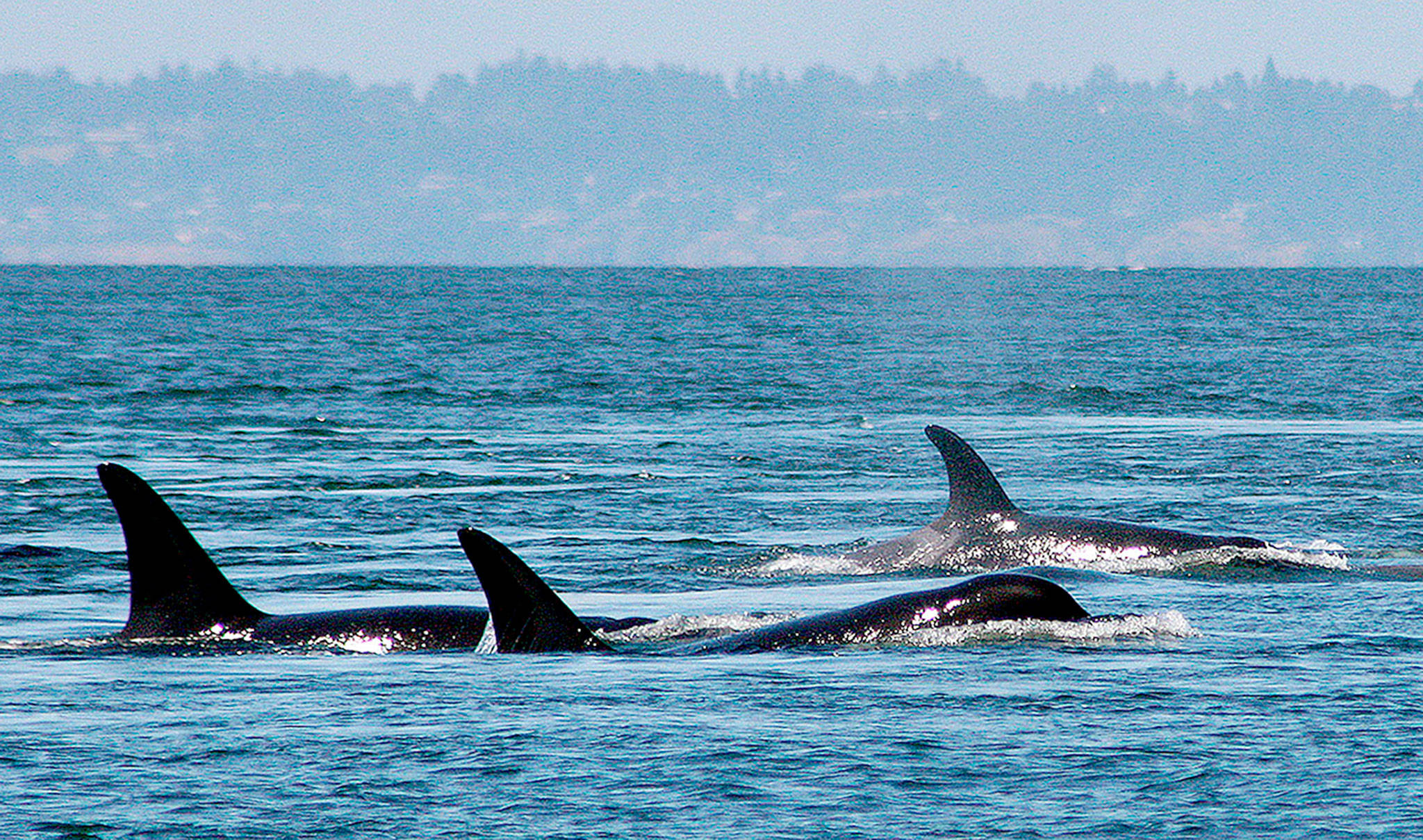Seattle Times
Canada has adopted a suite of measures intended to improve orca access to food by reducing commercial and recreational fishing for chinook salmon and quieting vessel noise and disturbance that can interfere with whale foraging.
Some of the policies go further than laws just adopted by the Washington Legislature.
The measures, announced Friday by Canadian agencies, create new sanctuaries for endangered southern resident killer whales in the Salish Sea that will be closed to vessel traffic. Washington has no such sanctuaries today.
The sanctuaries will be in place from June 1 through October 31 — prime southern resident killer whale season in the Salish Sea — at Pender and Saturna Islands and Swiftsure Bank, important feeding areas for the southern residents. The areas would be closed except to emergency vessels and indigenous food, social and ceremonial fisheries.
The southern residents are at grave risk of extinction. Vessel noise is one the key threats to the southern residents’ survival because it can interfere with their ability to find prey that also is scarce because of a downturn in the orca’s preferred food, chinook salmon.
The new policies also double the distance vessels must stay away from southern resident killer whales to 400 meters, or 437 yards. That is more strict than the Legislature’s new policy for commercial whale watch operators in Washington waters. Tours can’t approach southern resident killer whales in Washington waters closer than 300 yards, or follow from behind closer than 400 yards.
Canada’s new policy also allows commercial whale watch operators, in return for not offering southern resident tours, to watch transient or Bigg’s killer whales at only 200 yards.
Commercial operators that sign on for the deal, which is still being finalized, could still watch the southern residents if they encounter them, albeit at the 400-meter distance.
A voluntary slow-down to 7 knots for all small vessels within 1 kilometer of killer whales also was adopted.
For commercial shippers such as bulk carriers, ferries, tankers, and cruise ships, an ongoing voluntary slowdown was extended, and will start earlier, beginning June 1 if whales are present. The slow-down area is also being expanded from Haro Strait to Boundary Pass.
To leave more prey available for the southern residents, recreational and commercial fishing closures were imposed for chinook in the Strait of Juan de Fuca and the Canadian Gulf Islands.
The target date for implementation of the measures is June 1, except for the fisheries closures, which are in July and August. All are interim policies intended to be in place for 2019.
In Washington, new restrictions on whale watching are still coming. Under SSB 5577 passed by the Legislature and signed by Governor Inslee, new fees and regulations on whale watching are to be developed by 2021 by the Washington Department of Fish and Wildlife to reduce the daily and cumulative impacts of commercial whale watching on the southern residents.
New restrictions are to consider the number of days and hours that tours can operate, as well as the areas in which tours may be given.
Washington lawmakers also at the last minute of the 2019 legislative session included $750,000 in the state budget to fund an analysis by a citizen panel of impacts and possible responses to dam removal on the Lower Snake River. Lawmakers did not fund continuation of the governor’s task force on orca recovery, but it is expected to continue to operate with funds from the governor’s office.
Alan McGillivray, Canadian president of the Pacific Whale Watch Association and owner of the Prince of Whales tour operation said the Canadian policies, particularly the vessel slow-down to quiet boat noise, could benefit the southern residents.
The agreement not to offer tours of southern residents won’t hurt business, he predicted, because operators can still watch the whales if they are encountered — though at 400 meters, it’s not much of an experience for viewers. At half a mile, what watchers see is a tiny fin in the distance, McGillivray said.
Some Washington conservationists were unimpressed with the initiatives announced across the border. Canada is still pursuing the TransMountain pipeline expansion, which will increase the risk of oil spills in the Salish Sea, and vessel noise, “so it’s a double whammy,” said Robb Krehbiel, Northwest representative for Defenders of Wildlife based in Seattle.
Stormwater and sewage pollution from Canada also has not been addressed at nearly the level as in the US. Canada’s farmed Atlantic salmon net pen industry in the Salish Sea — which pollutes and can spread disease to wild salmon — also is among the largest in the world. “They are making progress but still have a long to go,” Krehbiel said.
Talk to us
> Give us your news tips.
> Send us a letter to the editor.
> More Herald contact information.

























